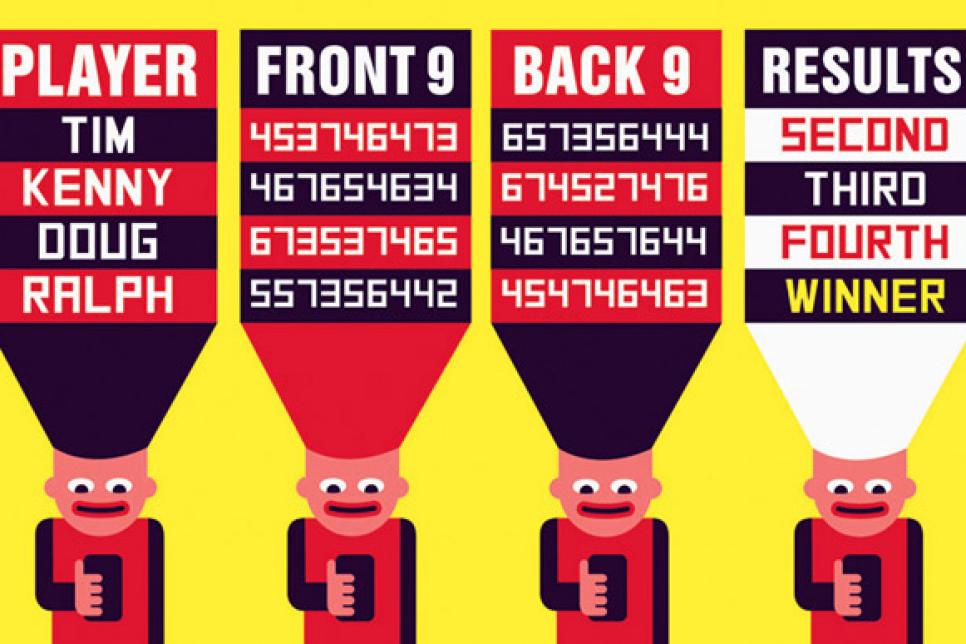An Easier Way To Keep Score

Every autumn, my friends and I take a three-day end-of-season buddies trip, for which Hacker (real name) handles all the paperwork. Each evening, when we gather in the bar of our hotel to argue about where to eat dinner, he sits at a table by himself, wearing one of his many pairs of dime-store reading glasses and erasing numbers from sheets of paper. One year, he lost his records and stayed up all night re-creating them from a stack of semi-illegible scorecards--only to discover, in the morning, that he'd left the folder on the front seat of his car.
This year, I decided to test the feasibility of outsourcing Hacker. Graham Stevens, a reader from North Carolina, had told me about scrolf.com, which he and his friends had used on a trip. They set up their tournament ahead of time, on the Scrolf (terrible name!) website, and then one member of each foursome entered scores, hole by hole, on a smartphone, creating a live leader board. "I don't know about your trips," Stevens told me in an email, "but we used to spend a huge amount of time on ours doing blind draws and staring at scorecards and figuring out bets after handicaps. Scrolf's interface isn't great, but we were able to make it work on both iPhones and Androids, and we had 40 guys."
Live scoring makes me nervous, unless it's done by nonparticipants, because it encourages dawdlers to stare at their phone when they ought to be hitting their ball. On our trip, I used Scrolf only after each round, as a Hacker reinforcement. It caught several scorecard arithmetic errors (not made by him) and correctly disallowed one skin and identified two overlooked ones. And it's free, at least for the time being.
When we got home, I tried another free-for-now app, called GameBook, (golfgamebook.com), which was developed by a Finnish company. It also does live scoring, and at first glance it seems far more sophisticated than Scrolf. But I found it annoying to use for anything more than a single foursome playing more than a single format during more than a single round. Creating events is cumbersome, and--for now at least--you can do it only through the app, not the website. And the smartphone interface, though superficially attractive, is poorly conceived and full of dead ends.
I also tried a high-end online program, called golftripgenius.com. Its many appealing features include a utility called Perfect Pairings, which automatically performs a chore that drives Hacker bats: arranging the groups so that everyone plays with as many other people as possible, yet Euan and Adam (who are father and son) never have to play with each other. You can use different formats for different rounds (team best ball, individual stroke play, net skins, Stableford pairs, ringer, nassau, Ryder Cup, you name it), and you can use multiple formats simultaneously. And once you've got everything the way you want it you can print scorecards, with handicap strokes marked. It also does live scoring.
GolfTripGenius is not 100 percent user-friendly. "Whereas a teamset must have at least two teams, a group is simply a list of players," one explanation reads. "If you define a tournament with 'pair by' set to a group, then the tournament will be player vs. all players in the group." Using it is also expensive: $3 per player per round, up to a maximum of $249 per trip. That's $50 more than the retail price of the home-and-business edition of Microsoft Office, which you get to keep. I'm tempted, nevertheless--even though Hacker, so far, charges nothing.
NUMBERS GAME
GameBook and GolfTripGenius have large databases, and if your course isn't listed you can request that it be added, or (with GameBook) enter the information yourself. With Scrolf, you have to manually enter ratings, slopes, yardages and handicap indexes. That isn't hard to do, though, and you can find what you need by looking up scorecards at oobgolf.com.